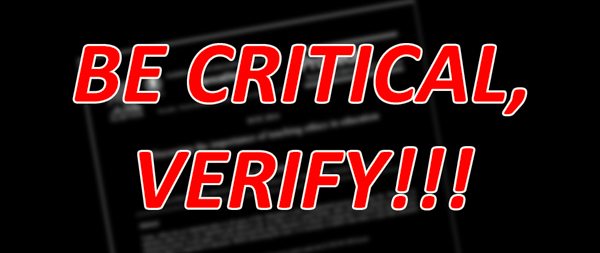This week I had what I thought was a simple assignment that I had to write for one of my classes. We were assigned an article to read last week and this week we were to write a discussion post about the article. I don’t want to give too much away about the exact article so as to not spoil its re-use in future classes.
An unethical logic chain
To change it up a bit, but keep the same sentence structure, let’s say the title was, “The Importance of Teaching Gardening in School.” The author of the article starts with a traditional introduction, but then identifies a common associate between the title subject term and another subject and uses that association as a justification to substitute the second term for the first. Continuing with my analogy, the author explains why teaching gardening is so beneficial, then the author states that gardening is said to be associated with farming, and that people often use the words gardening and farming interchangeably, and we have a strong belief in one particular type of farming, so this type of farming should be taught in school. You see the shoddy logic chain?
Who wrote this?
In the real article within the introduction that author actually cited a real research article that stated the exact association the author was making was completely wrong. On further investigation, I found that the author was part of an educational advisory team that was overseen by the government of the author’s country. That foreign government’s controlling political party changed in 2003, and since had been pushing a very conservative and religious restructuring of the country’s secular school system.
Media reports the harm done
I found articles by Reuters, CNBC, and the BBC detailing the situation, with research showing that the education change was having a negative effect on that country’s test scores.
Who would publish such an article?
Then I wonder how such an article, obviously government propaganda, could have been accepted by a journal. The publishing journal was Procedia, which was published by Elsevier. Now, Elsevier publishes a lot of journals, online journals and books. Titles like Cell, Lancet, and ScienceDirect, and they also make the Mendeley reference organizing and citation software. But, Procedia, now defunct, was not a prestigious journal.
From Wikipedia:
Procedia
Procedia is an open access journal series published by Elsevier.
The purpose of Procedia is to publish, for a fee, “proposed conference proceedings” in a “dedicated online issue”. Elsevier advertises this product as having a focus on delivering high quality content and maintains “Peer-review is under the responsibility of the conference organizers.
Peer review policy controversy
Elsevier formerly published Procedia – Social and Behavioral Sciences in which authors were permitted to directly self-publish. The only requirements for publishing in this journal were to grant Elsevier exclusive publishing rights, to promise the paper would be peer reviewed at some point in the future and to promise the paper was their own original work and of course, pay the publishing fee.
https://en.wikipedia.org/wiki/Procedia
From the Elsevier Author’s Guide for Procedia:
“Peer-review is under the responsibility of the conference organizers who according to the international peer-review standards may use single blind, double blind or open peer review. For details specific to the conference peer-review process, please contact the conference organizer or the guest editor of the conference.”
https://www.elsevier.com/journals/procedia-computer-science/1877-0509/guide-for-authors
Conclusion – The article was actually just government propaganda
Now, it’s clear! It looked like a peer-reviewed journal, presented itself as a peer-reviewed journal, but really wasn’t a peer-review journal. Dishonest journalism, I thought that was only on cable tv. This was a propaganda piece trying to justify the actions of this foreign government. You just can’t let down your guard, let this be an example of the importance of teaching critical media literacy in schools!!!
Do you have any research horror stories? Share them below.
Post Categories:
- Creativity (2)
- Hack (2)
- Media Literacy (1)
- Metacognition (1)
- Photography (2)
- Research (1)
- Uncategorized (2)
